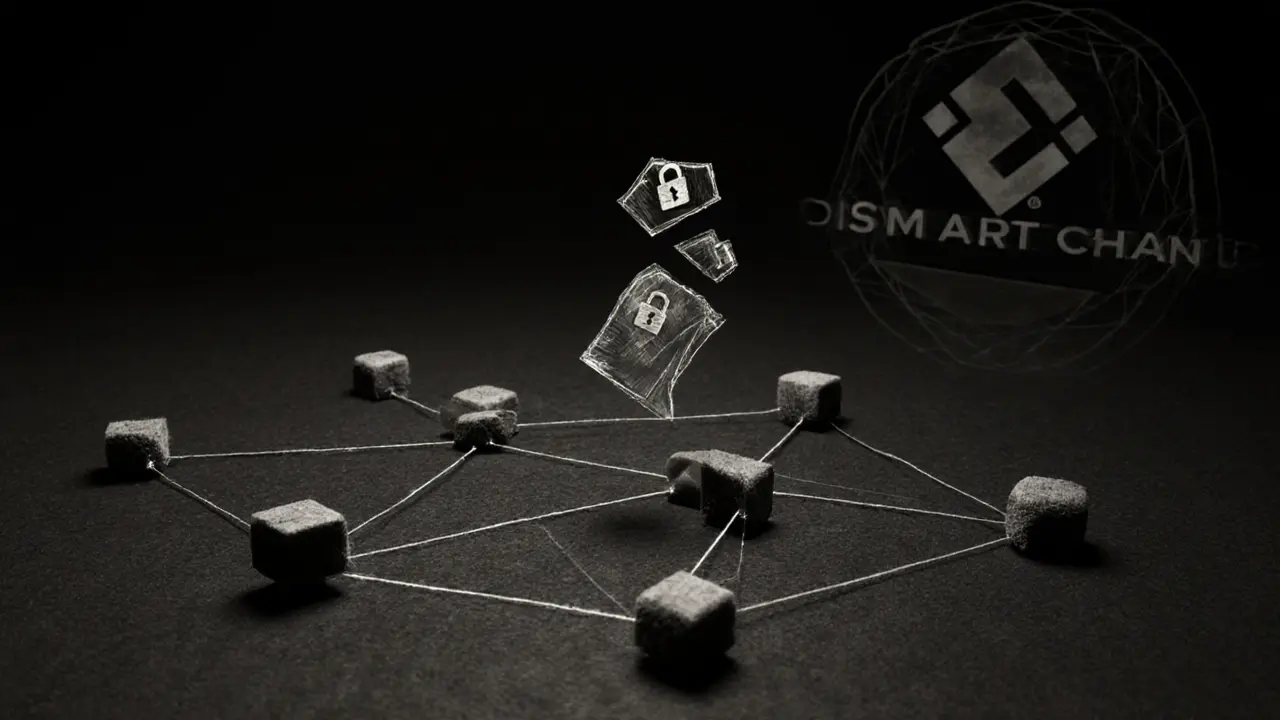WeSendit (WSI) Token Calculator
Current Token Metrics
Price per WSI
Circulating Supply
Market Cap
Daily Volume
Investment Calculator
Token Burn Impact
Projected effect of upcoming token burns on circulating supply
Market Comparison Chart
Relative pricing of WSI vs. similar decentralized storage tokens
If you’ve ever wondered whether there’s a crypto coin that actually helps businesses move files securely, the answer is WeSendit (WSI) crypto coin. Born in Switzerland and built on the Binance Smart Chain, WSI aims to blend everyday file sharing with Web3‑level privacy. Below you’ll get a clear picture of what the token does, how its tech works, and whether it’s worth a glance in your portfolio.
TL;DR
- WSI is a BEP‑20 utility token that powers the WeSendit decentralized file‑transfer platform.
- It runs on Binance Smart Chain (BSC) with contract 0x837A130aED114300Bab4f9f1F4f500682f7efd48.
- Circulating supply: ~780millionWSI; price (Oct2025): $0.000993; market cap ~8.38BTC.
- Key tech: peer‑to‑peer network, zero‑knowledge proofs, decentralized identifiers.
- Traded on Gate.io, PancakeSwap V2/V3, XT; liquidity modest, daily volume ≈ $110k.
- Token burns planned for ~200millionWSI before the beta launch.
- Analysts see neutral‑to‑bearish short‑term outlook; long‑term value tied to enterprise adoption.
What is WeSendit (WSI) Token?
WeSendit (WSI) is a Swiss‑based BEP‑20 cryptocurrency that fuels a Web3 file‑transfer and storage platform. Launched after a $800k ICO, the token lets users pay for encrypted uploads, earn rewards for running storage nodes, and access enterprise‑grade data‑privacy tools.
The token’s ticker is $WSI, it has 18 decimals, and the smart contract lives on the Binance Smart Chain (BSC). By using a BSC token rather than an ERC‑20, transaction fees stay below a cent, which matters when you’re moving large files frequently.
How the Underlying Technology Works
WeSendit doesn’t store files on a single server. Instead, it creates a peer‑to‑peer network where each node holds an encrypted fragment of the data. This design leans on three core Web3 components:
- Zero‑knowledge proofs verify that a file has been stored correctly without revealing its contents.
- Decentralized identifiers (DIDs) give each user a cryptographic ID that can be verified across borders, satisfying data‑sovereignty rules.
- Advanced cryptographic algorithms scramble data before it hits the network, making unauthorized reconstruction practically impossible.
Because the platform runs on BSC, each transaction-whether uploading a file or rewarding a node-gets recorded on a public ledger, adding an immutable audit trail that regulators appreciate.
Tokenomics: Supply, Distribution, and Burns
The total supply of WSI is capped at 1billion tokens. Currently, about 780million are circulating, giving a market‑cap of roughly 8.38BTC. The token distribution from the whitepaper looks like this:
| Category | Allocation % |
|---|---|
| Seed funding | 5% |
| Private sales | 8% |
| Token Generation Event | 2.5% |
| Team | 12% |
| Advisors | 5% |
| Community & rewards | 67.5% |
Before the upcoming beta launch, the team plans to burn roughly 200million WSI tokens. Burning reduces total supply, which could lift the token’s price if demand stays steady.

Market Performance and Trading Landscape
As of 2October2025, WSI trades at $0.000993 with a 24‑hour price rise of 6.30% and a daily volume of $110,286.48. The most active pair is WSI/USDT on PancakeSwap, accounting for about half of the total volume.
Four exchanges list the token: Gate.io, PancakeSwap V2, PancakeSwap V3, and XT. While the price volatility sits at 3.71%, the relatively low liquidity means even modest buy‑sell walls can swing the market.
Technical indicators paint a mixed picture: RSI (14‑day) sits at 47.51 (neutral), the 50‑day SMA is $0.001034, and the 200‑day SMA stands at $0.001686, suggesting a bearish tilt. CoinCodex predicts a drop to $0.000725 by the end of October 2025, a 25.31% decline from current levels.
Ecosystem Partnerships and Exchanges
WeSendit’s Swiss headquarters lend credibility, especially for regulated sectors like finance and healthcare. The platform already serves 3.5million users across 150+ countries, ranging from small businesses to government agencies that need data to stay within national borders.
Security audits by Hacken.io and SolidProof.io are publicly available on GitHub, showing no critical vulnerabilities in the smart contract. The verified contract on BSCScan lets anyone inspect token transfers and total supply in real time.
How WSI Stacks Up Against Other Decentralized Storage Tokens
While many projects focus purely on storage (Filecoin, Storj, Arweave), WeSendit positions itself as a file‑transfer aggregator that also offers storage as a service. Below is a quick side‑by‑side look:
| Feature | WeSendit (WSI) | Filecoin (FIL) | Storj (STORJ) | Arweave (AR) |
|---|---|---|---|---|
| Primary focus | Secure file transfer & enterprise SaaS | Decentralized storage marketplace | Encrypted cloud storage | Perma‑storage (immutable) |
| Blockchain | Binance Smart Chain (BEP‑20) | Filecoin network | Ethereum ERC‑20 | Arweave blockchain |
| Transaction fees | ~$0.0003 (BSC) | Variable, often high | Ethereum gas | Low, AR‑specific |
| Enterprise compliance | Swiss data‑privacy standards | Limited | Limited | Limited |
| Node rewards | WSI tokens for storage nodes | FIL rewards | STORJ rewards | AR rewards |
WSI’s niche lies in its drag‑and‑drop UI, zero‑knowledge verification, and Swiss‑backed privacy guarantees-features that large‑scale cloud providers and pure storage chains don’t prioritize.
Risks and Considerations for Investors
Before you put money into WSI, keep these points in mind:
- Liquidity constraints: Daily volume under $120k means larger orders can cause slippage.
- Regulatory exposure: While Swiss law is friendly, cross‑border data rules can evolve, potentially affecting enterprise adoption.
- Competitive pressure: Established cloud giants (AWS, Azure) are rolling out their own encryption‑first services, which could erode WSI’s market share.
- Token burn uncertainty: The announced 200million burn is contingent on beta launch timelines; delays could dampen price expectations.
Balancing these risks against the platform’s ten‑year operational track record-something most pure‑Web3 projects lack-helps decide whether WSI fits a diversified crypto portfolio.
Future Roadmap and What to Watch
The next 12months are crucial for WSI:
- Beta platform release: Expected Q12026, introducing node‑operator incentives and tighter integration with BSC DeFi protocols.
- Continued token burns: Planned quarterly burns aim to shrink supply by another 50million tokens.
- Enterprise pilot programs: Partnerships with European finance firms are in talks, which could boost real‑world usage metrics.
- Further audit rounds: Additional security reviews from firms like Quantstamp are slated for mid‑2026.
Tracking these milestones on the official blog or the project’s GitHub will give early signals of traction or setbacks.

Frequently Asked Questions
What blockchain does WSI run on?
WSI is a BEP‑20 token on the Binance Smart Chain, which offers low‑cost, fast transactions compared with Ethereum.
How can I earn WSI tokens?
Token rewards are paid to node operators who provide storage capacity and bandwidth. Users also receive small rebates for frequent file uploads.
Is the WSI smart contract audited?
Yes. Independent audits by Hacken.io and SolidProof.io are published on the project’s GitHub repository and the contract is verified on BSCScan.
Where can I trade WSI?
WSI is listed on Gate.io, PancakeSwap V2, PancakeSwap V3, and XT. The WSI/USDT pair on PancakeSwap sees the highest volume.
What is the current price outlook?
Analysts are split. CoinCodex forecasts a drop to $0.000725 by the end of October2025, while bullish voices point to the upcoming beta launch and token‑burn schedule as price catalysts.
How does WSI differ from Filecoin?
Filecoin focuses on a marketplace for raw storage capacity, whereas WSI concentrates on secure file transfer and enterprise‑grade compliance, using a BSC‑based token for cheap transactions.
Can I run a WSI node from home?
Yes. The platform provides lightweight node software that runs on standard VPS or even a powerful home PC. Operators earn WSI tokens proportional to the storage they contribute.
Is WSI a good hedge for data‑privacy concerns?
Because WSI uses zero‑knowledge proofs and Swiss data‑privacy standards, it offers stronger privacy than most centralized cloud services, making it attractive for privacy‑focused users.


Swiss privacy laws give WSI a serious edge over the usual flimflam crypto projects. The low‑fee BSC backbone means you’re not paying a fortune to move a file, and that’s a win for anyone with a modest budget. Plus the zero‑knowledge proofs make snoopers sweat, so if you care about data sovereignty, this token isn’t a joke. Bottom line: WSI is punching well above its weight, and anyone still writing it off is just being stubborn.
Everyone’s hyping the token like it’s gold, but the real world needs movers, not hype. If you ask me, the burn plan sounds like a sales trick, not a long‑term value driver.
Honestly, I think the whole “enterprise‑grade” claim is a bit overblown. Most businesses still rely on the big cloud providers, and switching to a crypto‑based file service is a big leap. The token’s price is cheap, but cheap doesn’t equal value, especially with the low daily volume. Still, if you’re a crypto‑curious techie, it might be worth a peek just to see how the UI feels.
Don’t let the low volume scare you away – early adopters can actually shape the network. Running a node from a home server isn’t as hard as it sounds; the software is lightweight and the rewards are decent for the storage you provide. Plus, the upcoming beta will bring tighter DeFi integrations, so you’ll see more utility for your WSI. Keep an eye on the burn schedule; each reduction could give a modest boost if the platform gains traction.
When one contemplates the interplay between decentralized identifiers and zero‑knowledge proofs, a tapestry of trust emerges, woven delicately across the Binance Smart Chain, where transaction fees hover near insignificance, and yet the ramifications for data sovereignty are profound; the Swiss regulatory backdrop lends an air of legitimacy, which, in a landscape riddled with speculative fervor, cannot be dismissed lightly. Moreover, the auditable nature of each upload, recorded immutably on‑chain, offers a level of transparency that traditional cloud services simply do not provide.
The tokenomics, while superficially balanced, hide a potential pitfall: the community‑reward pool dominates the allocation, yet its distribution mechanisms are vague, raising concerns over future dilution. Additionally, the reliance on BSC exposes the project to network congestion during peak periods, which could erode the cost‑advantage claim. In short, the whitepaper lacks concrete milestones beyond the announced burns.
Sure, it’s another meme token.
It’s astonishing how some projects pretend to be the saviors of privacy while dancing with the same old centralization sharks. The purported “Swiss‑grade” compliance feels more like a marketing gloss than a substantive guarantee. If you’re looking for genuine data‑rights advocacy, you might want to look beyond glossy tokenomics.
One could argue that the very act of decentralizing file transfers redefines ownership in the digital age. Yet, without widespread institutional adoption, the network risks remaining a niche hobby. The philosophical appeal is undeniable, but practicality often trumps idealism. Watching how the beta rollout aligns with real‑world compliance will be telling.
Keep your eyes on the burn schedule – each reduction could give a modest boost! 👍
WSI may be small now, but with the right push it can become a staple for privacy‑first businesses. Don’t underestimate the power of a low‑fee network when you’re moving gigabytes daily.
From a technical standpoint, the token’s BEP‑20 implementation adheres to ERC‑20 standards, ensuring compatibility with existing DeFi infrastructure. However, the current liquidity depth on PancakeSwap V2 suggests that any sizeable order will experience slippage beyond the quoted spread. The burn mechanism, calibrated at approximately 20% of circulating supply over the next twelve months, aligns with a token‑scarcity model but lacks a clear demand‑side catalyst. Moreover, the audit reports from Hacken and SolidProof, while thorough, did not address potential cross‑chain vulnerabilities. In summary, the protocol is sound, yet market dynamics remain the primary risk factor.
Got to give credit where it’s due – the team’s transparency with audit reports is refreshing. If you’re a newcomer, start small, test the node software, and see how the rewards flow. Remember, community support often makes or breaks these platforms, so stay engaged! 🚀
When you peel back the layers of the WSI ecosystem, you discover a convergence of privacy‑focused cryptography, cost‑effective transaction mechanics, and an ambition to democratize file transfer on a global scale. The token’s BEP‑20 nature means users benefit from sub‑cent transaction fees, which is a non‑trivial advantage when transmitting large data payloads. Zero‑knowledge proofs underpin the confidentiality model, allowing verification of storage without exposing the underlying content – a feature that sets it apart from many storage‑only projects. The Swiss jurisdiction provides a regulatory veneer that appeals to enterprises wary of data‑sovereignty issues, especially in Europe and North America. While the circulating supply sits at roughly 780 million, the planned token burns aim to contract the supply, theoretically enhancing scarcity. However, the burns are contingent upon the successful rollout of the beta platform, introducing an element of execution risk. The current daily volume hovers near $110 k, suggesting modest liquidity that could be prone to price swings on larger trades. Yet, the active community of over three million users across 150 countries indicates real‑world demand for secure file transfer solutions. Audits from Hacken and SolidProof bolster confidence in the smart contract’s integrity, though no system is immune to future exploits. The roadmap, featuring quarterly burns and enterprise pilot programs, offers tangible milestones to watch. Competition from established cloud giants remains fierce, but WSI’s niche focus on privacy and low fees could carve out a sustainable market segment. As with any crypto venture, due diligence is essential; investors should monitor token velocity, adoption metrics, and regulatory developments. In short, WSI presents a compelling blend of technology and market positioning, but its ultimate success hinges on execution and broader adoption. Keep an eye on how the beta launch translates into actual usage and whether the promised token economics materialize.
Honestly, the burn schedule feels like a rallying cry for the community – it’s a chance to rally together and boost the token’s profile. If the beta launches on time, the hype could translate into real user growth, which is exactly what we need. I’m all in for seeing WSI make a splash in the privacy arena, and I think the upcoming partnerships will prove its worth. Let’s keep the conversation alive and push the project forward!
The project’s narrative seems overly polished, bordering on self‑congratulatory. While the audits are a plus, the lack of clear demand drivers makes me skeptical about long‑term sustainability. I’d advise caution until we see genuine enterprise onboarding beyond the hype.